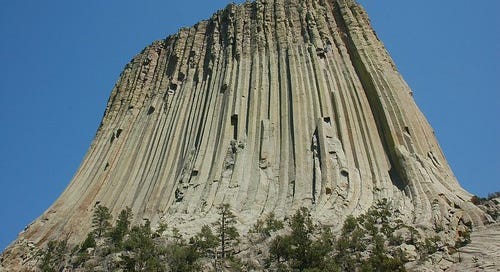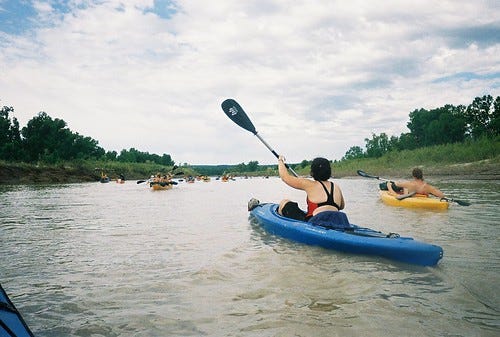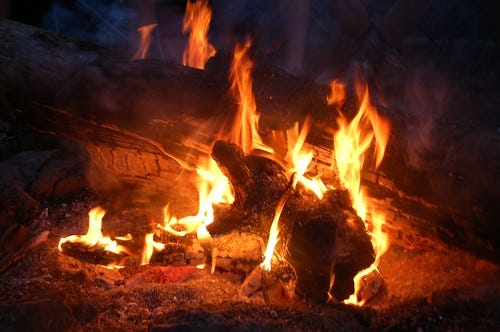Summer Seminar: A Summary (part 2)
After another 50 miles of biking on the Mickelson Trail (broken up over two days), the novelty of the South Dakota experience began to wear thin. At times, it was downright burdensome, as I was dealing with 28 high school seniors who I so desperately wanted to see "get it" with regard to the academic aspect of the trip, but wasn't sure all of them were. For instance:
"Yesterday on the trip back from Mystic, I listened to seven senior boys wax eloquent on the virtues and 'awesome-ness' of Pokemon, beginning with the cards they used to play with in third grade and culminating in a discussion of their best strategies for the video game now. This went on for at least half an hour before they changed topics to music and the best technology for downloading songs for free.
When I asked if they knew that what they were doing was illegal, they wrote me off, saying it was a 'gray area,' and went on to talking about something else, with little desire for explanation or questions for discussion. They had already made up their minds as to what they needed the law to be, so that's what the extent of the conversation was as well. This, on top of many of the girls not being able to complete a sentence without, like, using the word 'like' three times (minimum), and I recognize how overly judgmental I can be, which in itself is frustrating. I need to control my attitude better."
Having left our campsite at Custer, we hiked up and down Harney Peak (the highest peak in South Dakota) before making our way through Deadwood (hello, tourist trap), and finally into Spearfish, which I really liked. While the kids did laundry, a few of us staff visited a local coffeeshop, checked out the bookstore at Black Hills State University, and then we all took an afternoon trip across the Wyoming state line to see Devil's Tower (cool, but you only need to see it once). That evening, we made a really tough (1,000-ft. in three-fourths of a mile) hike up Spearfish Canyon, but the sunset at the end was a nice reward.
Leaving from Spearfish the next morning, we hiked Bear Butte, one of the most sacred Indian religious sites for the Plains Indians and a historic meeting point for many of the most famous chiefs like Red Cloud and Sitting Bull. As we had done at most of our major stopping points, we had our final "core" here, the third of our ethics track. In general, the students seemed to enjoy these formal presentation times (nine altogether) from their teachers, after which I would usually give a writing assignment to serve as a mechanism for response. I just would have liked more informal discussion from them along the trails and in the van that showed real interest, but the groupthink/herd mentality proved too strong.
After the hike, we drove to Pierre (pronounced "Pier") for pizza and an overnight in a hotel, before meeting back up the next morning with Caleb Gilkerson, our guide and trip outfitter in the Badlands, for two days of kayaking and a night (our last) camping out on the river. We were scheduled to do the Cheyenne, but because of all the rain, the river was too high and had covered all the campsites; thus, we opted for the White (which was anything but), and kayaked approximately 20 miles over two days to where the White met up with the Missouri.
Though the mosquitoes were bad, the food (steak and walleye) was great, and I had the best night of sleep on the trail in my tent up on the 15-foot-high sand bar (two Sominex probably had something to do with that). I enjoyed the serenity of the kayaking, but because the Missouri was so high downstream, there wasn't much of a current; it was like paddling on a lake, which was fine - we weren't in a hurry - but by the end of two half days, I had fulfilled my kayaking quota.
After pulling out of the river, we drove to Firesteel Creek Lodge to enjoy a last night in some nice accommodations before driving eleven hours home the next day. We had our last meeting as a group that evening, in which I gave the students the details of "turning in" their writing assignments (due this Saturday). I also asked them to include a self-evaluation of how they made the most of the trip (and perhaps how they didn't). I'll be interested to read their observations in hopes that sitting down to think and write about it on their own might teach some of what we may not have on the trip.
Personally, the two weeks were impacting in several ways: I came away with a new appreciation and sympathy for Native Americans as a people (both past and present), as well as a new desire to camp and make better use of our National Park system (though don't look for us at a campsite near you anytime soon - more on that next week). I also want to read more American history and get past the broad brush strokes of my current understanding into more of our history's nuances, as well as give new consideration to environmental organizations that I perhaps had not paid as much attention to before.
And, I want to keep exposing kids - my students at Westminster, as well as my own - to these important ideas and experiences, persevering and praying them through the inevitable periods of apathy that often accompany affluence, somehow planting seeds of mercy, justice, and humility along the way that one day might grow into fruit of the same kind. In many ways, Summer Seminar reaffirmed my calling to teach and write, and for that (among many other things) I'm grateful for my time in South Dakota.








